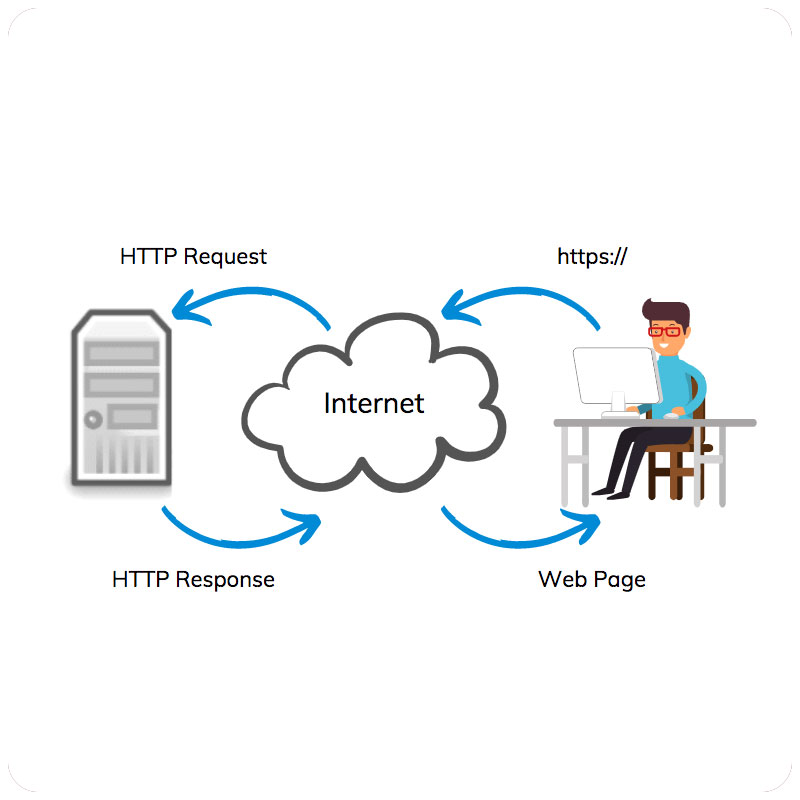Why Web Hosting Matters
The very first, and arguably the most important, step in putting up a website is choosing your web hosting partner. This is where your website is going to live! It has to be accessible and secure for your clients and customers, and it should be affordable and easy to use for you. Read on to learn more about how to launch your website with the right web hosting, like BlueHost!
1. Understand How Web Hosting Works
To pick the right web host and the right web hosting package for your business’s needs, you need to understand how web hosting works. It’s kind of like renting an apartment in a building with a doorman. Your website will live in the apartment, and the doorman will decide how many visitors can come in at a time. While it’s never a wise business decision to spend more than you have to, you do need to make sure that there’s enough room in the apartment and that it can handle all the visitors you expect.


2. Select a Web Hosting Package
Building on the analogy above, it’s time to pick out your apartment. If the main feature of your website will be a blog – mostly text, a few images, and no moving parts – you’re probably good with the smallest web hosting package they offer. But if you’re going to be putting up a store with high-resolution videos of all your products, forums for users to share experiences, a customer service live chat, and a fully featured shopping cart, then you’re going to need something more than the equivalent of a one-room studio apartment.
3. Decide Server Structure
You usually get the choice of your own dedicated server, space on a shared server, or a virtual private server. A dedicated server means it’s all yours. You don’t have any roommates. You can take up all the space you want with your stuff.
A shared server means that you’re sharing the apartment with roommates, and if the closets are full, you just can’t bring anything else in. A virtual private server in the cloud is more like a hotel; there are a whole lot of you under one roof, but everyone has their own space with everything they need.


4. Make Sure That You Have Enough Bandwidth
This is the doorman part. Not only do you need enough space, but you need to make sure that you can accommodate all the visitors that you want and expect. Bandwidth is the amount of connections that can be made to your website at any one time. If you’re expecting a lot of visitors, you need a lot of bandwidth.
5. Check Out the Security
There are two types of security that matter here. First, you want to be sure that your website itself is secure. You don’t want anyone to be able to hack in and put their stuff on your page. Next, if you have customers, you need to be sure that their data is secure; this is extra important if you are taking payments from customers and their financial data is being shared on your website.


6. Talk About Price
Web hosting is way more affordable than it used to be even 20 years ago, but even so, nobody wants to pay more than they have to. Talk to your hosting provider about which package provides the best value for your business, and remember that value means more than just dollars out the door. Value means that you’re getting what you need for those dollars, and the absolute least expensive provider or package may not be providing what you need.
7. Visit Customer Support
So far, you’ve probably been talking with the sales team at the web hosting provider. Once the papers are signed, though, you’ll be dealing with the support team from then on out. Visit the customer support platform to see what that looks like. Is there 24/7 support? Can you actually talk or chat with a live person whenever you need to, or do you have to submit a trouble ticket and wait for them to get back to you?


8. Ask About Backups and Disaster Recovery
No one wants to think about these, but it would be terribly irresponsible not to. What happens if you accidentally delete your entire website (which isn’t really all that easy to do, so don’t worry, but you still need to ask)? Do they keep complete backups, and how often do they refresh those backups?
You also have to ask about what happens if the web host themselves experience a disaster. Do they have alternate server space they can use to get clients up and running again?
9. What About the Extras?
You may have thought that we moved on from the apartment analogy, but not quite. Just as you look for amenities such as a pool or a gym at an apartment complex, you can probably expect, or at least hope for, some extras from your web hosting provider.
The right web hosting providers can offer you amenities such as integrated WordPress hosting, assistance with domain name registry, an SSL certificate, and other things that make your business life easier.

Recent Enhancements to Bluehost’s Hosting Services
Bluehost has introduced several new features to enhance its hosting services. The AI-powered site builder assists users in creating websites quickly and efficiently. Additionally, under the leadership of CEO Sachin Puri, Bluehost has revamped its e-commerce offerings, incorporating AI-driven tools like LLM.txt for product discovery, single-click checkout, and integrated payments to reduce friction in the commerce journey. Furthermore, Bluehost’s hosting plans now support up to 400,000 visits per month, with scalable options available for high-demand businesses, ensuring optimal performance as traffic grows.

10. Look at Reviews and Reputation
When you’ve decided on the right web hosting provider and package, your last step as a responsible business person is to do your due diligence. Read reviews to see what current and previous customers have to say, and dig a little deeper to find out what the hosting service’s reputation is among people in the industry. You need to feel good about where your website is going to live!



